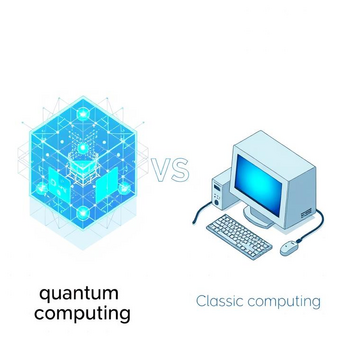The Future of Quantum Computing: Revolutionizing Industries and Technology

Explore the future of quantum computing, its impact on industries, and the challenges researchers must overcome to unlock its potential. Learn how it will revolutionize sectors like healthcare, cybersecurity, and finance.
Introduction to Quantum Computing
Quantum computing is often heralded as the next frontier in computing technology. Unlike classical computers, which process data in binary bits (0s and 1s), quantum computers use quantum bits or qubits, which take advantage of quantum mechanical properties like superposition and entanglement. These properties allow quantum computers to process vast amounts of data simultaneously, vastly outpacing the capabilities of classical machines in certain tasks. As a result, quantum computing holds the potential to revolutionize industries by solving problems too complex or time-consuming for today’s computers.
In this article, we will explore the current advancements in quantum computing, the promising industries that could benefit from its deployment, and the challenges that researchers and engineers face in unlocking its full potential. As the field continues to grow, the implications of quantum computing stretch far beyond just scientific research—quantum technology is poised to impact business, healthcare, security, and more.
To understand the fundamentals of quantum computing, visit IBM’s Quantum Computing Portal at https://www.ibm.com/quantum-computing.
Current Progress in Quantum Computing
Quantum computing is progressing rapidly, with several breakthroughs achieved in recent years. Key players in the field include Google, IBM, Microsoft, and various research institutions worldwide. In 2019, Google made headlines by claiming to achieve quantum supremacy—the point at which a quantum computer solves a problem that would take the most powerful classical supercomputers thousands of years to solve. Google’s quantum computer, Sycamore, completed a calculation in 200 seconds that would have taken the world’s fastest supercomputer approximately 10,000 years.
Despite these exciting achievements, the quantum computers in use today are still in the Noisy Intermediate-Scale Quantum (NISQ) stage. This means they have limited qubits, and the error rates remain high due to instability in quantum states. These early-stage quantum devices are not yet capable of solving large-scale real-world problems. To achieve practical and scalable quantum computing, further research is needed to improve error correction, coherence times, and qubit quality.
Quantum computing research is progressing alongside advancements in quantum software and algorithms. New algorithms are being developed to maximize the potential of quantum computers, while quantum error correction techniques are being refined to handle the inherent instability of qubits. The next step is the creation of fault-tolerant quantum computers capable of running larger, more complex computations reliably.
To explore the latest quantum breakthroughs, visit the National Quantum Initiative at https://www.quantum.gov.
Revolutionizing Industries with Quantum Computing
Quantum computing’s ability to process vast amounts of data at unprecedented speeds makes it a game-changer for many industries. Let’s explore some of the most exciting sectors where quantum technology is expected to make a significant impact:
- Healthcare and Drug Discovery: The process of drug discovery involves simulating the interaction of molecules, proteins, and other biological elements—a task that requires immense computational power. Quantum computers could accelerate this process by simulating molecular structures and chemical reactions more efficiently than classical computers. This could lead to breakthroughs in treating complex diseases such as cancer, Alzheimer’s, and rare genetic disorders.
For instance, researchers are already exploring the potential of quantum computing to understand protein folding, which is crucial for developing drugs that target specific proteins involved in disease. By simulating proteins at the quantum level, scientists could speed up the discovery of new treatments and vaccines.
To learn more about quantum computing in healthcare, visit the Quantum Computing for Drug Discovery initiative at https://www.qc4dd.com.
- Cryptography and Cybersecurity: One of the most discussed impacts of quantum computing is its potential to break many of the encryption methods currently used to secure digital data. Public-key encryption, the backbone of modern online security, could be compromised by a sufficiently powerful quantum computer. However, quantum computing also offers the potential to develop quantum encryption methods that are far more secure than classical systems. Quantum key distribution (QKD), for example, uses quantum mechanics to generate cryptographic keys that are immune to eavesdropping.
Quantum-safe encryption algorithms are being developed to ensure that as quantum technology progresses, the privacy and security of digital communication remain intact. Governments and industries around the world are preparing for the “quantum threat” by investing in quantum encryption technologies.
For more information on quantum encryption, check out The Quantum Cryptography Project at https://www.quantumcryptography.com.
- Finance and Optimization: Quantum computing holds immense promise for optimizing financial portfolios, performing high-frequency trading, and assessing risk. The complexity of financial markets involves numerous variables, and quantum computers are well-suited for solving complex optimization problems that would take classical systems too long to compute. Algorithms designed for quantum systems could enhance financial predictions and help companies manage portfolios more efficiently.
For instance, Monte Carlo simulations—commonly used in risk analysis and derivative pricing—could be significantly sped up by quantum computing, providing faster and more accurate predictions in volatile financial markets. Investment firms and financial institutions are already exploring how quantum computing can be used to model market behavior more accurately.
To explore quantum computing in finance, visit JPMorgan’s Quantum Computing Research at https://www.jpmorgan.com/quantum-computing.
New Frontiers: Quantum Computing and Artificial Intelligence
As the fields of artificial intelligence (AI) and quantum computing converge, we are entering an exciting frontier of computing capabilities. Quantum computing could be used to enhance machine learning algorithms by allowing them to process and analyze data exponentially faster than classical computers. In particular, quantum machine learning (QML) holds promise for improving the efficiency of data analysis in applications such as natural language processing, image recognition, and autonomous systems.
For example, quantum computers could assist in the training of neural networks by quickly solving optimization problems related to learning patterns in large datasets. This would significantly speed up the development of AI models, allowing for more accurate predictions in applications like healthcare diagnostics, financial forecasting, and personalized marketing.
Moreover, quantum computing could also contribute to the development of more advanced AI models that are capable of learning from exponentially larger datasets, leading to breakthroughs in AI’s ability to process and understand complex data.
For more details on quantum machine learning, visit Google AI’s Quantum Computing Research at https://www.blog.google/quantum-computing.
Challenges to Overcome in Quantum Computing
Despite the exciting possibilities, quantum computing still faces several key challenges that must be overcome before it can realize its full potential:
- Error Rates and Quantum Decoherence: One of the most significant obstacles is the issue of quantum decoherence, which occurs when a qubit loses its quantum state due to interaction with its environment. This interference can cause errors in calculations, and reducing error rates remains a priority for researchers. Quantum error correction is an ongoing area of research, but it requires additional qubits and computational resources to work effectively, making it a complex problem.
- Scalability and Reliability: Currently, quantum computers are limited by the number of qubits they can manage. Scaling up quantum computers while maintaining their stability and coherence is a major challenge. As more qubits are added, the system becomes more prone to errors. Researchers are working on new ways to increase the number of stable qubits while maintaining the fidelity of quantum computations.
- Cost and Accessibility: Quantum computers are highly specialized machines that require extremely low temperatures and sensitive equipment to function. As a result, they are expensive to build and operate. Making quantum computers more affordable and accessible for a wide range of industries is essential for widespread adoption.
- Talent and Expertise: Quantum computing is an extremely specialized field, and there is a growing demand for researchers, engineers, and professionals with expertise in quantum mechanics, quantum algorithms, and quantum hardware. To fully harness the power of quantum computing, there needs to be an increase in educational programs and research funding to train the next generation of quantum experts.
For a detailed look at the challenges in quantum computing, visit The Quantum Computing Institute at https://www.qcinstitute.org.
The Future of Quantum Computing: What Lies Ahead?
As we look toward the future, quantum computing is likely to become an integral part of technological ecosystems in industries ranging from healthcare to cybersecurity. The development of quantum algorithms, quantum hardware, and error-correction methods will allow quantum computers to tackle real-world problems that were previously out of reach for classical machines.
While practical, large-scale quantum computing may still be a decade away, the future is incredibly promising. We are likely to see the development of hybrid quantum-classical systems that combine the strengths of quantum computing with the robustness of classical machines. This will enable a wide variety of industries to benefit from quantum computing’s advantages without waiting for the full maturation of the technology.
Quantum computing could also open new doors for scientific discoveries, allowing researchers to explore complex physical systems, simulate quantum chemistry, and understand the fundamental forces of nature in unprecedented ways. The next decade will likely see significant strides toward overcoming existing barriers, with quantum computers becoming increasingly capable, accessible, and transformative.
For more insights into the future of quantum computing, check out MIT’s Quantum Computing Lab at https://www.mit.edu/quantum-computing.
FAQs
1. What is quantum computing?
- Quantum computing uses quantum mechanics to process information, enabling computers to solve complex problems faster than classical computers.
2. How will quantum computing revolutionize industries?
- Quantum computing will transform industries such as healthcare, finance, cybersecurity, and materials science by solving problems that are currently too difficult for classical computers.
3. What are the challenges of quantum computing?
- Some challenges include high error rates, scalability issues, high operational costs, and the need for specialized expertise.
4. When will quantum computers become mainstream?
- While quantum computing is still in its early stages, many experts believe that it will take another 10–15 years before large-scale quantum computers are viable for practical applications.
5. How can I learn more about quantum computing?
- You can explore online resources like IBM Quantum (https://www.ibm.com/quantum-computing), MIT’s Quantum Computing Lab (https://www.mit.edu/quantum-computing), and Google AI’s Quantum Research (https://www.blog.google/quantum-computing).
6. What is quantum supremacy?
- Quantum supremacy refers to the point at which a quantum computer can solve a problem that is practically unsolvable by the most powerful classical computers in a reasonable amount of time. Google’s 2019 achievement with their Sycamore quantum processor is considered a milestone in achieving quantum supremacy.
7. How does quantum computing differ from classical computing?
- Classical computers use binary bits (0s and 1s) to process information, whereas quantum computers use quantum bits, or qubits, which can exist in multiple states simultaneously due to quantum superposition, allowing quantum computers to process much larger datasets and solve more complex problems.
8. What is quantum cryptography?
- Quantum cryptography uses the principles of quantum mechanics to secure communication. One of the key applications is quantum key distribution (QKD), which ensures that any attempt to intercept a message will be immediately detected, offering a level of security that classical cryptography cannot match.
9. Can quantum computers solve any problem faster than classical computers?
- Not all problems are suited for quantum computing. Quantum computers excel at specific tasks, such as simulating quantum systems, optimizing large datasets, and factoring large numbers, which can have applications in fields like drug discovery, cryptography, and financial modeling. However, for many everyday tasks, classical computers are still more efficient.
10. What industries will benefit the most from quantum computing?
- Industries like healthcare, finance, cybersecurity, materials science, and logistics are poised to benefit the most from quantum computing. It will help speed up drug discovery, improve financial modeling, enhance encryption, and optimize supply chain processes, to name a few.
Did you find this helpful? If you did, please share and stay tune to our blog!!




